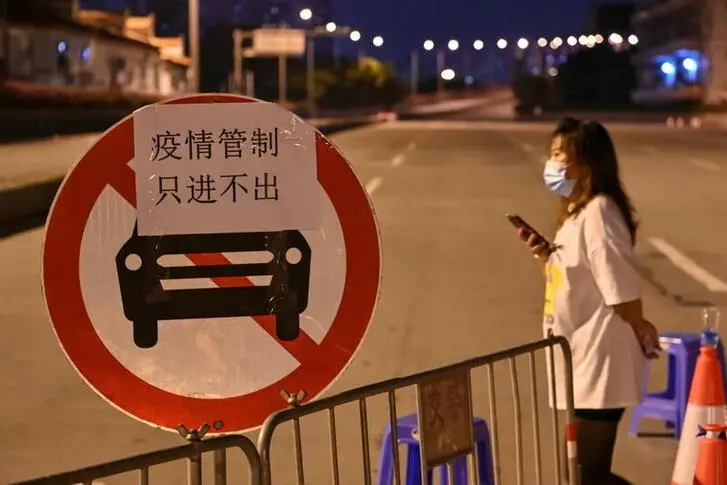PHOTO
In January, the international science journal Nature surveyed more than 100 immunologists, infectious disease experts and virologists on whether the coronavirus disease (COVID-19) could be eradicated. About 90 percent responded that it could remain endemic, which means that it will continue to circulate in different communities for many years. In recent months, governments have been devising bold roadmaps for living with the virus once it becomes endemic. Theoretically, this can be achieved once the majority of the global population has built up immunity against the virus, either through vaccination or infection and recovery.
Lately, we have been hearing numerous governmental announcements about easing restrictions and reverting to a semblance of normality. For example, in the past few weeks, Singapore’s ministerial taskforce on COVID-19 shared a new vision for living with the virus, entailing easing restrictions on the one hand, while keeping some precautionary measures on the other. This critical milestone will be achieved sometime next month, when two-thirds of the population will be fully vaccinated and with the rollout of rapid test kits that produce results in two minutes. The UK and France have also made similar announcements recently.
With the largest vaccination campaign in history underway, many more governments will soon start easing restrictions. Research finds that approved vaccines are effective at reducing transmission and mortality rates. Experts are also discussing yearly booster shots to strengthen immunity against the virus. Currently, 26.6 percent of the global population has received at least one dose of a COVID-19 vaccine. However, only 1.1 percent of people in low-income countries have received their first dose thus far, mainly due to a shortage of supply. This limitation will surely slow the pace of the global recovery from the pandemic. As such, many international efforts are underway to secure vaccine supplies to low-income countries, such as those pledged by the UAE, Australia and Europe.
Countries will remain cautious and put in place plans to prevent COVID-19 transmission. Detailed guidance will be published by sector to direct stakeholders on sanitation requirements, self-isolation rules according to different scenarios, maintaining physical distancing between groups attending indoor recreation and leisure activities, and guidance on hosting large-scale events.
A recent innovation in this regard is the emergence of digital health passes, which enable people to share their vaccination status or COVID-19 test results before entering crowded venues. Recently, the French government announced that, from next month, people over the age of 12 will need to show a special COVID-19 health pass before entering cinemas, museums, sports matches, restaurants, cafes, shopping centers, theatre, theme parks, hospitals, or long-distance trains.
With summer in full swing, many countries are dropping pandemic restrictions to boost domestic and international tourism. For example, they have signed bilateral travel agreements with other countries that they deem to pose low risks to their populations. Requirements are easy to meet, such as proof of vaccination, a negative PCR test result or a report indicating recovery from COVID-19. These requirements will probably remain for the near future to mitigate transmissions caused by foreign travelers.
Countries will also need to upgrade their healthcare infrastructure and hire medical workers to accommodate periodic surges in cases. We have come a long way in terms of discovering a range of effective treatments that have successfully reduced hospitalization and death rates. Going forward, investments in COVID-19 treatments will be a critical part of many governments’ response plans. For example, the US administration last month launched the Antiviral Program for Pandemics, which consists of a $3 billion investment aimed at developing and manufacturing the next generation of antiviral treatments against viruses with pandemic potential, including the current COVID-19 virus. Such discoveries will certainly alleviate the virulence of the virus and its impact on public health.
Since the onset of the pandemic, we have witnessed an acceleration in the digital transformation across public services and business operations. Going forward, it will be vital for governments and private sector organizations to invest in innovative digital technologies that will enable them to deliver their services to the masses. For example, thanks to pre-emptive investment in cutting-edge data analytics, many policymakers were able to devise effective response plans to mitigate transmission in coronavirus hotspots. Also, countries that set up online learning technologies are able to effortlessly migrate students to distance learning if emergencies arise.
Telehealth services will be vital for medical workers to provide patients with the necessary consultations, diagnoses, mental health services, follow-up appointments, and care strategies in the case of life-threatening medical issues. Additionally, employees could capitalize on the many creative digital technologies that facilitate their remote work, such as collaboration tools and virtual meeting organizers. The pandemic has also inspired a shift toward ecommerce and online shopping. Many enterprises will find it instrumental to invest in digital technologies to sustain and grow their businesses. In fact, many governments, including Singapore’s, have introduced grants for enterprises to adopt game-changing digital solutions.
It cannot be emphasized enough how important personal social responsibility will be in curbing infection rates in the near future. As governments lift restrictions, it will remain vital to sustain public health awareness campaigns on the significance of good personal hygiene, wearing protective gear, and quarantining when unwell.
Countries are encouraged to harness their creativity to imagine a post-pandemic world that can return us to a semblance of normality. This seems very much possible thanks to advances in technology, science and the social sciences.
- Sara Al-Mulla is an Emirati civil servant with an interest in human development policy and children’s literature. She can be contacted at www.amorelicious.com.
Copyright: Arab News © 2021 All rights reserved. Provided by SyndiGate Media Inc. (Syndigate.info).





















